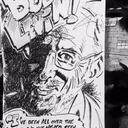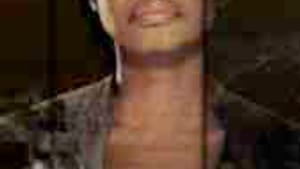Stay in the Loop
BSR publishes on a weekly schedule, with an email newsletter every Wednesday and Thursday morning. There’s no paywall, and subscribing is always free.
In the early 1970s, while struggling to maintain a low overhead, one-man law practice and simultaneously pursue an M.A. in creative writing at San Francisco State University, I found my secretaries for the former through postings on the departmental bulletin board of the latter. One of these hires, Jeanne Sirotkin, an expatriate from Detroit, was part of the local "young poets" scene. And one evening she invited my wife Adele and me to a group reading at the Intersection for the Arts in the basement of a former church in North Beach.
It was no longer the North Beach we'd read and dreamed about in college. The jazz clubs had given way to topless bars, and the topless bars were being squeezed by the spawn of Linda (Deep Throat) Lovelace. Now the hard-core hip turned on with speed and skag, not jug wine and grass.
Remnants of an earlier generation of poets, more mad than naked, dragged themselves to and from readings: Bob Kaufman, throttled by his Vow of Silence; Gregory Corso, crumpled beneath his Bad Boy being. But they appeared to burn more like warning flares to the dangers of their chosen path than guiding lights toward glory.
Nevertheless, several of the budding talents in Jeanne's circle, like Bob Gluck (author of Jack the Modernist) and Jana Harris (Alaska) and Jessica Hagedorn (Dogeaters), flowered into noteworthy literary careers. Jeanne herself, after issuing her chap book (An Unzipped Dress), moved to the Midwest, married an orthopedist, raised four children and now publishes short stories in quarterlies.
Scars of attempted suicide
That particular evening, though, was garlanded by Ntozake Shange's reading"“ accentuated with music, enlivened through dance"“ of portions of what was becoming For Colored Girls Who Have Considered Suicide When the Rainbow is Enuf.
Shange, though only in her mid-20s then, already bore the scars from several self-inflicted attempts upon her life. The '60s had steered her"“ the daughter of a surgeon and a psychotherapist, the holder of degrees from Barnard and the University of Southern California"“ through the Young Lords and S.N.C.C., to a women's collective in Oakland called the Cosmic Du-Wop Commune.
This journey had equipped her to provide one of those encounters in which members of an audience, holding no preconceived expectations, meet an artist who"“ by piercing their hearts or rewiring their minds or expanding the parameters of their souls"“ reveals that the world holds more than they had previously imagined. I've received such illumination from Cecil Taylor and Anne Sexton and Patti Smith; and I received it that night from Shange.
With passion and rage, intelligence and fury, humor and a Titan missile's payload of pizzazz, she launched that basement into the heavens. Man, she blasted it. She might be Walt Whitman, Adele and I thought. She could be on Johnny Carson.
Black woman's talisman
What she did instead, of course, was take For Colored Girls to New York. There, presented by Joseph Papp's Public Theater as a "choreopoem," seven women, identified only as Lady in Red, Lady in Blue, Lady in Orange, etc., delivered 20 of Shange's poems, set to music and professionally choreographed.
It won two Tonys and ran two years on Broadway. It became a best-selling book and a PBS special. Now it's taught and performed in high schools and colleges. For Colored Girls has come to be held in near talismanic regard for its honoring of black women's triumphs over subjugation, both personal and political. Now it has become a major motion picture produced, directed and (re)written by Tyler Perry.
Perry is best known for a series of high-grossing, morally and socially conservative, family-oriented entertainments, in which, cross-dressed, he stars as Mabel "Madea" Simms. He was a controversial choice to make For Colored Girls. And he has since been faulted for giving the women, in the service of his narrative, names and lives and furnished apartments, as well as, more significantly, shucking the celebratory and laying on the punitive.
Rainy matinee in Berkeley
Adele and I caught a Saturday matinee over the film's third weekend in Berkeley. It was raining; Cal was mere blocks away, being thrashed in football by Stanford; and the entire audience consisted of a young, dreadlocked black male, four middle-aged white women, two middle-aged black women, and the two of us. A documentary downstairs about pastry chefs out-drew it.
But we, who had never seen the finished show nor any of Perry's previous work nor read any of the criticism, and who had only the remembrance of that enchanted basement 35 years ago to measure against it, thought the flick pretty good.
Some of the acting (Kimberly Elise, as Crystal, in particular) astounded us; some scenes scorched the earth. Still, even for us, that screening flew highest when Shange's poetry blew across its frames. Only then did the majesty of the irreplaceable appear; only then was the magic of the never before/never again present.
Too frequently the miraculous quality we recalled was cut prematurely or over-ridden by the pedestrian or eliminated entirely. It's not that we don't recommend the movie: It is strong and serious and worthy of attention. Yet having seen the film, both of us decided independently to purchase the book.
It was no longer the North Beach we'd read and dreamed about in college. The jazz clubs had given way to topless bars, and the topless bars were being squeezed by the spawn of Linda (Deep Throat) Lovelace. Now the hard-core hip turned on with speed and skag, not jug wine and grass.
Remnants of an earlier generation of poets, more mad than naked, dragged themselves to and from readings: Bob Kaufman, throttled by his Vow of Silence; Gregory Corso, crumpled beneath his Bad Boy being. But they appeared to burn more like warning flares to the dangers of their chosen path than guiding lights toward glory.
Nevertheless, several of the budding talents in Jeanne's circle, like Bob Gluck (author of Jack the Modernist) and Jana Harris (Alaska) and Jessica Hagedorn (Dogeaters), flowered into noteworthy literary careers. Jeanne herself, after issuing her chap book (An Unzipped Dress), moved to the Midwest, married an orthopedist, raised four children and now publishes short stories in quarterlies.
Scars of attempted suicide
That particular evening, though, was garlanded by Ntozake Shange's reading"“ accentuated with music, enlivened through dance"“ of portions of what was becoming For Colored Girls Who Have Considered Suicide When the Rainbow is Enuf.
Shange, though only in her mid-20s then, already bore the scars from several self-inflicted attempts upon her life. The '60s had steered her"“ the daughter of a surgeon and a psychotherapist, the holder of degrees from Barnard and the University of Southern California"“ through the Young Lords and S.N.C.C., to a women's collective in Oakland called the Cosmic Du-Wop Commune.
This journey had equipped her to provide one of those encounters in which members of an audience, holding no preconceived expectations, meet an artist who"“ by piercing their hearts or rewiring their minds or expanding the parameters of their souls"“ reveals that the world holds more than they had previously imagined. I've received such illumination from Cecil Taylor and Anne Sexton and Patti Smith; and I received it that night from Shange.
With passion and rage, intelligence and fury, humor and a Titan missile's payload of pizzazz, she launched that basement into the heavens. Man, she blasted it. She might be Walt Whitman, Adele and I thought. She could be on Johnny Carson.
Black woman's talisman
What she did instead, of course, was take For Colored Girls to New York. There, presented by Joseph Papp's Public Theater as a "choreopoem," seven women, identified only as Lady in Red, Lady in Blue, Lady in Orange, etc., delivered 20 of Shange's poems, set to music and professionally choreographed.
It won two Tonys and ran two years on Broadway. It became a best-selling book and a PBS special. Now it's taught and performed in high schools and colleges. For Colored Girls has come to be held in near talismanic regard for its honoring of black women's triumphs over subjugation, both personal and political. Now it has become a major motion picture produced, directed and (re)written by Tyler Perry.
Perry is best known for a series of high-grossing, morally and socially conservative, family-oriented entertainments, in which, cross-dressed, he stars as Mabel "Madea" Simms. He was a controversial choice to make For Colored Girls. And he has since been faulted for giving the women, in the service of his narrative, names and lives and furnished apartments, as well as, more significantly, shucking the celebratory and laying on the punitive.
Rainy matinee in Berkeley
Adele and I caught a Saturday matinee over the film's third weekend in Berkeley. It was raining; Cal was mere blocks away, being thrashed in football by Stanford; and the entire audience consisted of a young, dreadlocked black male, four middle-aged white women, two middle-aged black women, and the two of us. A documentary downstairs about pastry chefs out-drew it.
But we, who had never seen the finished show nor any of Perry's previous work nor read any of the criticism, and who had only the remembrance of that enchanted basement 35 years ago to measure against it, thought the flick pretty good.
Some of the acting (Kimberly Elise, as Crystal, in particular) astounded us; some scenes scorched the earth. Still, even for us, that screening flew highest when Shange's poetry blew across its frames. Only then did the majesty of the irreplaceable appear; only then was the magic of the never before/never again present.
Too frequently the miraculous quality we recalled was cut prematurely or over-ridden by the pedestrian or eliminated entirely. It's not that we don't recommend the movie: It is strong and serious and worthy of attention. Yet having seen the film, both of us decided independently to purchase the book.
What, When, Where
For Colored Girls. A film written and directed by Tyler Perry, based on the poems of Ntozake Shange. For Philadelphia-area theaters and show times, click here.
Sign up for our newsletter
All of the week's new articles, all in one place. Sign up for the free weekly BSR newsletters, and don't miss a conversation.
 Bob Levin
Bob Levin
